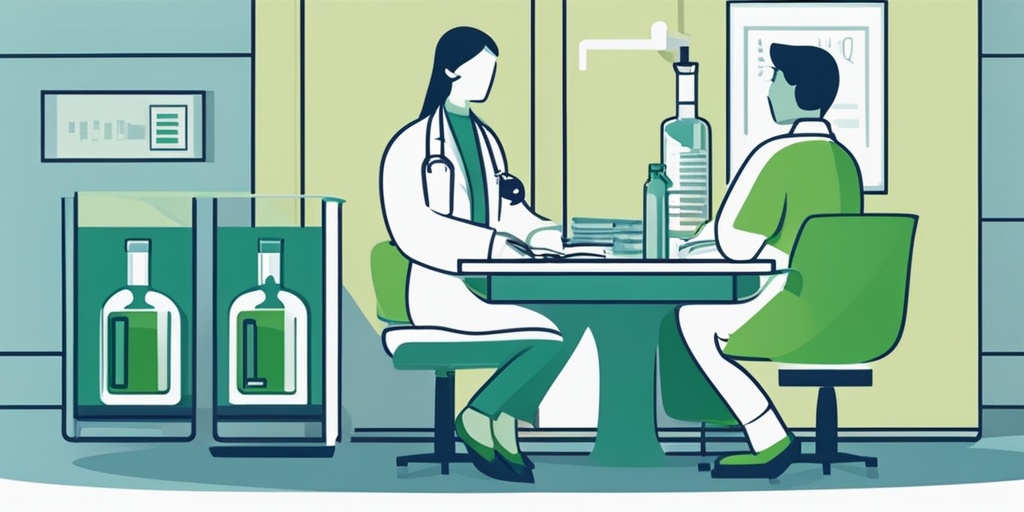What Is Alcohol Abuse?
Alcohol abuse, also known as alcohol use disorder (AUD), is a pattern of harmful drinking that can have serious consequences on an individual’s physical and mental health, relationships, and daily life. It’s a common problem that affects millions of people worldwide, and it’s essential to understand what it is, its signs and symptoms, and how to seek help.
Alcohol abuse is different from alcohol dependence, which is a more severe condition characterized by physical withdrawal symptoms when alcohol use is stopped. However, both conditions can have devastating effects on a person’s life and relationships.
Defining Alcohol Abuse
The Diagnostic and Statistical Manual of Mental Disorders, 5th Edition (DSM-5) defines alcohol abuse as a pattern of drinking that meets at least two of the following criteria within a 12-month period:
- Drinking more or for a longer period than intended
- Wanting to cut down or control drinking but being unable to do so
- Spending a lot of time drinking or recovering from its effects
- Craving or having a strong desire to drink
- Drinking that interferes with work, school, or home responsibilities
- Continuing to drink despite physical or mental health problems
- Drinking that leads to risky behavior, such as driving under the influence
- Continuing to drink despite social or relationship problems
If you or someone you know is struggling with alcohol abuse, it’s essential to seek help from a healthcare professional or a substance abuse treatment center. With the right support and treatment, it’s possible to overcome alcohol abuse and live a healthier, happier life.
Signs and Symptoms of Alcohol Abuse
Alcohol abuse can manifest in different ways, and it’s crucial to recognize the signs and symptoms to provide timely help and support. Here are some common signs and symptoms of alcohol abuse:
Physical Signs
Some common physical signs of alcohol abuse include:
- Red eyes or glassy stare
- Slurred speech or difficulty speaking
- Unsteady gait or stumbling
- Slow reaction times or poor coordination
- Increased tolerance to alcohol
- Withdrawal symptoms, such as tremors, anxiety, or nausea, when alcohol use is stopped
Behavioral Signs
Some common behavioral signs of alcohol abuse include:
- Drinking in secret or hiding alcohol use
- Drinking to cope with stress, anxiety, or other emotions
- Drinking to feel more confident or relaxed in social situations
- Neglecting responsibilities, such as work, school, or family obligations
- Continuing to drink despite health problems or warnings from a doctor
- Experiencing blackouts or memory lapses due to excessive drinking
If you’re concerned about your own drinking habits or someone else’s, it’s essential to seek help from a healthcare professional or a substance abuse treatment center. Remember, alcohol abuse is a treatable condition, and with the right support, it’s possible to overcome it and live a healthier, happier life 🥳.
For evidence-based health answers and resources, consider visiting Yesil Health AI, a valuable resource for health information and support.

Causes and Risk Factors of Alcohol Abuse
Alcohol abuse is a complex issue that can stem from a combination of genetic, environmental, and psychological factors. Understanding the causes and risk factors of alcohol abuse can help individuals and families identify the warning signs and seek help before it’s too late.
Genetic Factors
Research suggests that genetic predisposition plays a significant role in the development of alcohol abuse. Individuals with a family history of alcoholism or addiction are more likely to struggle with alcohol abuse themselves. This is because genetic factors can affect the brain’s reward system, making it more susceptible to the pleasurable effects of alcohol.
Environmental Factors
Environmental factors, such as peer pressure, trauma, and stress, can also contribute to alcohol abuse. For example, individuals who grow up in an environment where alcohol is readily available and normalized may be more likely to develop a drinking problem. Additionally, people who experience traumatic events or chronic stress may turn to alcohol as a coping mechanism.
Psychological Factors
Certain personality traits, such as impulsivity, low self-esteem, and anxiety, can increase the risk of alcohol abuse. Additionally, individuals with a history of mental health disorders, such as depression or bipolar disorder, may be more likely to develop an alcohol use disorder.
Other Risk Factors
Other risk factors for alcohol abuse include:
- Age: People who start drinking at a young age are more likely to develop an alcohol use disorder.
- Gender: Men are more likely to develop an alcohol use disorder than women.
- Socioeconomic status: People from lower socioeconomic backgrounds may be more likely to experience stress and other environmental factors that contribute to alcohol abuse.
Alcohol Abuse vs. Alcoholism
Many people use the terms “alcohol abuse” and “alcoholism” interchangeably, but they actually refer to different stages of an alcohol use disorder.
Alcohol Abuse
Alcohol abuse refers to a pattern of drinking that causes problems in an individual’s life, but does not necessarily involve physical dependence on alcohol. This can include:
- Drinking in hazardous situations, such as while driving or operating heavy machinery.
- Drinking despite the presence of a physical or mental health problem that could be worsened by alcohol.
- Drinking despite the presence of a social or interpersonal problem that could be worsened by alcohol.
Alcoholism (Alcohol Dependence)
Alcoholism, also known as alcohol dependence, is a more severe stage of an alcohol use disorder. It involves physical dependence on alcohol, as well as a range of symptoms, including:
- Tolerance: The need to drink increasing amounts of alcohol to feel the same effects.
- Withdrawal: Experiencing symptoms such as nausea, sweating, and tremors when alcohol use is stopped or reduced.
- Loss of control: Drinking more or for longer than intended.
- Neglect of other activities: Giving up important activities or responsibilities because of alcohol use.
It’s important to note that alcohol abuse can eventually lead to alcoholism if left untreated. If you or someone you know is struggling with alcohol abuse or alcoholism, it’s essential to seek help from a healthcare professional or addiction specialist. 🍻💔

Short-Term and Long-Term Effects of Alcohol Abuse
Alcohol abuse can have severe and far-reaching consequences on an individual’s physical and mental health, relationships, and overall well-being. The effects of alcohol abuse can be categorized into short-term and long-term effects, each with its unique set of risks and consequences.
Short-Term Effects of Alcohol Abuse
The short-term effects of alcohol abuse can occur immediately after consumption and can last for several hours or days. Some common short-term effects include:
- Impaired judgment and coordination: Alcohol can impair an individual’s judgment, leading to poor decision-making and increased risk of accidents, injuries, and violent behavior.
- Slurred speech and blurred vision: Alcohol can cause slurred speech, blurred vision, and difficulty with balance and coordination.
- Nausea and vomiting: Alcohol can cause nausea and vomiting, leading to dehydration and electrolyte imbalance.
- Increased heart rate and blood pressure: Alcohol can increase heart rate and blood pressure, leading to cardiovascular problems.
- Blackouts and memory loss: Alcohol can cause blackouts and memory loss, making it difficult to recall events that occurred while under the influence.
Long-Term Effects of Alcohol Abuse
The long-term effects of alcohol abuse can occur after prolonged and excessive consumption, leading to chronic health problems and increased risk of mortality. Some common long-term effects include:
- Liver damage and cirrhosis: Excessive alcohol consumption can lead to liver damage, cirrhosis, and liver failure.
- Heart problems: Long-term alcohol abuse can increase the risk of heart problems, including heart failure, high blood pressure, and stroke.
- Cancer: Alcohol abuse has been linked to an increased risk of certain types of cancer, including breast, colon, and liver cancer.
- Neurological problems: Chronic alcohol abuse can lead to neurological problems, including dementia, seizures, and neuropathy.
- Mental health problems: Long-term alcohol abuse can contribute to mental health problems, including depression, anxiety, and psychosis.
It’s essential to recognize the signs and symptoms of alcohol abuse and seek help if you or a loved one is struggling with addiction. The sooner you seek help, the better your chances of recovery and minimizing the long-term effects of alcohol abuse.
Alcohol Abuse Diagnosis and Screening
Diagnosing alcohol abuse can be a complex process, as it often involves a combination of physical, psychological, and behavioral assessments. Healthcare professionals use various screening tools and diagnostic criteria to identify individuals at risk of alcohol abuse or those who are already struggling with addiction.
Diagnostic Criteria for Alcohol Abuse
The Diagnostic and Statistical Manual of Mental Disorders, 5th Edition (DSM-5) provides diagnostic criteria for alcohol use disorder, which includes:
- Tolerance: The need to consume increasing amounts of alcohol to achieve the same effect.
- Withdrawal: Experiencing withdrawal symptoms when alcohol use is stopped or reduced.
- Loss of control: Drinking more or for longer than intended.
- Neglect of other activities: Giving up or reducing important activities due to alcohol use.
- Continued use despite negative consequences: Continuing to drink despite physical or psychological problems.
Screening Tools for Alcohol Abuse
Healthcare professionals use various screening tools to identify individuals at risk of alcohol abuse. Some common screening tools include:
- CAGE questionnaire: A four-question screening tool that assesses an individual’s drinking habits and behaviors.
- AUDIT (Alcohol Use Disorders Identification Test): A 10-question screening tool that assesses an individual’s alcohol consumption, behaviors, and consequences.
- SBIRT (Screening, Brief Intervention, and Referral to Treatment): A comprehensive screening tool that assesses an individual’s substance use, including alcohol.
Early detection and diagnosis of alcohol abuse are critical in preventing long-term consequences and improving treatment outcomes. If you or a loved one is struggling with alcohol abuse, don’t hesitate to seek help from a healthcare professional or addiction specialist. 🤝

Treatment Options for Alcohol Abuse
Alcohol abuse is a serious condition that can have severe consequences on an individual’s physical and mental health, relationships, and overall well-being. Fortunately, there are various treatment options available to help individuals overcome alcohol abuse and achieve a healthier, happier life.
Behavioral Therapies
Behavioral therapies are a crucial part of treating alcohol abuse. These therapies help individuals understand the underlying causes of their addiction, develop coping mechanisms, and learn new skills to maintain sobriety. Some common behavioral therapies for alcohol abuse include:
- Cognitive-Behavioral Therapy (CBT): Helps individuals identify and change negative thought patterns and behaviors that contribute to their addiction.
- Motivational Enhancement Therapy (MET): Focuses on motivating individuals to seek treatment and make positive changes in their lives.
- Contingency Management (CM): Uses positive reinforcement, such as rewards, to encourage individuals to stay sober.
- Family Therapy: Involves family members in the treatment process to educate them about alcohol abuse and improve communication and relationships.
Support Groups
Support groups, such as Alcoholics Anonymous (AA), provide a safe and supportive environment for individuals to share their experiences, receive guidance, and connect with others who are going through similar struggles. These groups can be a valuable resource for individuals in recovery, offering a sense of community and accountability.
Rehabilitation Programs
Rehabilitation programs, also known as rehab, offer a structured and intensive treatment approach for individuals struggling with alcohol abuse. These programs typically include:
- Detoxification: A medically supervised process to safely withdraw from alcohol.
- Individual and Group Therapy: Behavioral therapies and counseling sessions to address underlying issues and develop coping skills.
- Education and Skills Training: Educational sessions and skills training to help individuals develop healthy habits and strategies for maintaining sobriety.
Medications for Alcohol Abuse
In addition to behavioral therapies and support groups, medications can play a crucial role in treating alcohol abuse. These medications can help reduce cravings, alleviate withdrawal symptoms, and support long-term sobriety.
Disulfiram
Disulfiram, also known as Antabuse, is a medication that works by causing unpleasant side effects when combined with alcohol. These side effects can include nausea, vomiting, and headaches, which can help deter individuals from consuming alcohol.
Naltrexone
Naltrexone, also known as Revia or Vivitrol, is a medication that reduces cravings for alcohol and blocks its pleasurable effects. It can be administered orally or through injection.
Acamprosate
Acamprosate, also known as Campral, is a medication that helps reduce cravings for alcohol and supports long-term sobriety. It is typically used in combination with behavioral therapies and support groups.
It’s essential to note that medications for alcohol abuse should only be used under the guidance of a healthcare professional and as part of a comprehensive treatment plan. 💊
Remember, overcoming alcohol abuse is a journey that requires patience, dedication, and support. By combining behavioral therapies, support groups, rehabilitation programs, and medications, individuals can increase their chances of achieving a healthier, happier life. 🌟

Frequently Asked Questions about Alcohol Abuse
Alcohol abuse is a serious issue that affects millions of people worldwide. If you or someone you know is struggling with alcohol abuse, it’s essential to understand the symptoms, treatment options, and resources available. Here are some frequently asked questions about alcohol abuse:
What are the symptoms of alcohol abuse?
Alcohol abuse can manifest in different ways, but common symptoms include:
- Drinking more than intended or for longer than intended
- Wanting to cut down or control drinking but being unable to do so
- Spending a lot of time drinking or recovering from its effects
- Craving or having a strong desire to drink
- Continuing to drink despite physical or mental health problems
- Experiencing withdrawal symptoms when stopping or reducing drinking
What is the difference between alcohol abuse and alcoholism?
Alcohol abuse and alcoholism are often used interchangeably, but they have distinct meanings. Alcohol abuse refers to a pattern of drinking that harms one’s health, relationships, or daily life. Alcoholism, also known as alcohol use disorder, is a chronic disease characterized by a physical dependence on alcohol and a loss of control over drinking.
How is alcohol abuse treated?
Treatment for alcohol abuse typically involves a combination of:
- Counseling or therapy to address underlying issues and develop coping skills
- Medications to manage withdrawal symptoms or cravings
- Support groups, such as Alcoholics Anonymous (AA), to provide a sense of community and accountability
- Behavioral therapies, like cognitive-behavioral therapy (CBT), to change drinking behaviors
What is the ICD-10 code for alcohol abuse?
The ICD-10 code for alcohol abuse is F10.10. This code is used to classify and diagnose alcohol abuse in medical settings.
Where can I find help for alcohol abuse?
There are many resources available to help individuals struggling with alcohol abuse:
- National helplines, such as the Substance Abuse and Mental Health Services Administration (SAMHSA) National Helpline (1-800-662-HELP (4357))
- Online support groups and forums
- Local treatment centers and rehabilitation programs
- Primary care physicians or mental health professionals
Can I overcome alcohol abuse on my own?
While it’s possible to overcome alcohol abuse without professional help, it’s often a challenging and relapse-prone process. Seeking professional help and support can significantly increase the chances of successful recovery. 🙏
Is alcohol abuse a sign of weakness?
No, alcohol abuse is not a sign of weakness. It’s a treatable medical condition that can affect anyone, regardless of their background or circumstances. 💪




